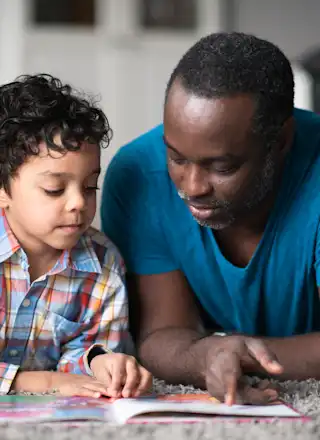How to talk to your child about discrimination
Talking about discrimination is never easy, that's why we've put together this guide to help you talk to and educate your child about it.

It often feels like we’ve come a long way in educating children, and society at large, about discrimination. But that doesn’t mean we should stop educating on this topic.
Despite significant progress in promoting equality and inclusion, many individuals, including children, continue to face discrimination. So, parents need to have difficult conversations about discrimination from an early age.
These discussions can help guide children through experiences they might witness or experience, fostering empathy and resilience. All so that, hopefully, someday children won’t have to worry about experiencing discrimination in their lives.
Ways in which people experience discrimination
Discrimination can manifest in various forms. There are also many places where children can experience discrimination whether that’s witnessing or experiencing discriminatory bullying at school or online through social media.
So it’s important that children recognise and understand discrimination. Here are some common ways people experience discrimination:
Racial discrimination: Unfair treatment based on skin colour or ethnic background.
Gender discrimination: Biases and inequalities based on gender, affecting opportunities and treatment.
Disability discrimination: Prejudice against individuals with physical or mental disabilities.
Religious discrimination: Hostility or unfair treatment based on religious beliefs.
Age discrimination: Prejudices faced due to being perceived as too young or too old.
Sexual orientation discrimination: Unfair treatment based on an individual's sexual orientation.
Understanding how people experience discrimination is a vital step in educating children and others about its impacts and importance.
Talking about discrimination with different age groups
Effective communication about discrimination should be tailored to your child’s age and level of understanding. Younger children may require simpler explanations and concrete examples, while older children and teens can handle more complex discussions about the underlying causes and consequences of discrimination.
It's important to create an open and safe environment where children feel comfortable asking questions and expressing their feelings. By adapting your approach to suit their developmental stage, you can help children grasp these important concepts and empower them to stand up against discrimination.
For young children (Ages 4-7)
Use simple language and concrete examples.
Encourage questions and provide honest, age-appropriate answers.
Read storybooks that feature diverse characters and discuss the themes.
For primary school children (Ages 8-11)
Explain the concepts of fairness and justice.
Discuss historical figures and events related to civil rights.
Role-play scenarios to practise responses to discrimination.
For teens (Ages 12 and Up)
Encourage open discussions about current events and personal experiences.
Explore complex topics like systemic discrimination and privilege.
Empower them to take action, such as joining school clubs or community groups focused on equality.
How to deal with discrimination
If your child encounters discrimination, you’ll need to provide support and guidance on how to deal with discrimination:
Listen and validate: Ensure your child feels heard and understood.
Teach coping strategies: Role-play responses to discriminatory comments or actions.
Seek support: Contact teachers or school counsellors for help. Utilise resources like NSPCC and Childline for additional support.
Encourage positive self-identity: Help your child build confidence and pride in their identity.
Why is it important to prevent discrimination
Discrimination has far-reaching consequences that can negatively impact individuals, communities, and society as a whole. It perpetuates inequality and division, and erodes trust in institutions.
Early education plays a crucial role in preventing discrimination by instilling values of respect, acceptance, and empathy from a young age. By introducing children to concepts of equality and diversity early on, you can lay the foundation for understanding and challenging discriminatory attitudes and behaviours. Research has shown that exposure to diverse perspectives during childhood promotes greater empathy and tolerance later in life.
Investing in early education that promotes inclusivity and diversity is key to building a society where discrimination is actively challenged and marginalised. By nurturing a culture of respect and understanding from the earliest stages of development, we can create a future where everyone has equal opportunities to thrive, regardless of their background or identity.
Empowering our children against discrimination for a brighter future
Conversations about discrimination are vital in shaping a more inclusive and equitable society. By educating and empowering our children, we equip them with the tools to stand against unfair treatment and foster a community of respect and understanding. This highlights why it is important to prevent discrimination at all levels of society.
At Explore Learning, our expert tutors are dedicated to promoting diversity and inclusion within our tuition centres and as an organisation. We recognise the power of education in combating discrimination and strive to create a supportive and inclusive learning environment for all children. Our tutors are trained to handle sensitive topics and are committed to nurturing a positive and respectful atmosphere.
We invite you to experience our approach first-hand. Book a free trial with Explore Learning today and see how our dedicated team can support your child’s academic and personal growth. Together we can build a brighter future where every child feels valued and respected.
Tuition from £114 / month
Available in centre or online
Cancel anytime
No joining fee
In centre or online
Memberships to suit you
Cancel anytime
No joining fee
In centre or online
Memberships to suit you
Cancel anytime
No joining fee
In centre or online
Memberships to suit you




